Keep your camera safe & secure using DSLR tripods
The main purpose of a tripod is to stabilize and support a camera. Though all models are created with such characteristics in mind, not all of them can securely handle the weight of DSLRs and lenses.
Navigating the segment of budget-friendly tripods, you can find a tripod that costs $100-200. However, if you are all about the safety of your equipment, you should have a closer look at premium models with a price tag starting at $400.
I have thoroughly studied the market and selected tripod brands from the most credible manufacturers (Manfrotto, Benzo, Vanguard, and Gitzo) for any budget.
Selecting a good tripod for your DSLR camera, you definitely want something long-lasting and reliable. Some photographers may want a lightweight and portable model, while others would prefer a tall one for full-height shooting.
No matter what your personal demands are, there are core characteristics, such as payload, working height, and folded length to consider in the first place.
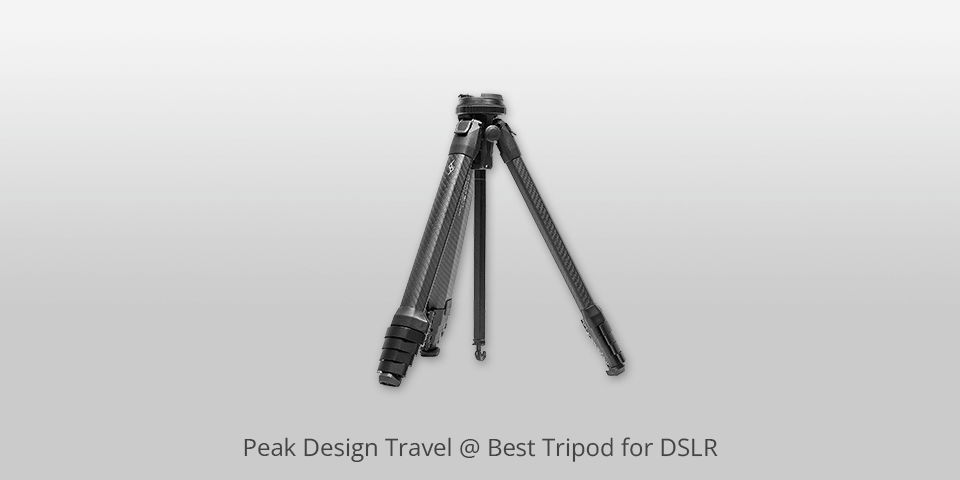
Material: Carbon Fiber | Max load: 20 lbs | Max height: 60 in | Weight: 2.84 lbs | Leg sections: 5
This travel tripod ticks all the boxes when it comes to taking images during hikes, bike trips, and voyages. It brags about terrific stability, high load capacity, and deployed height, with a diameter no larger than a water bottle.
In fact, this model has undergone a serious redesigning and was released after 4 years of engineering. If you want, you can use this tripod as an everyday model without experiencing any inconveniences.
The tripod has a low-profile ball head that is simple yet very functional. The central column is occupied with a phone holder.

Setting up a tripod for shooting is very easy thanks to a flip-leg design. If you are fond of this tripod but your budget is tight, you can opt for an aluminum version. It is 40% cheaper and slightly less vibration-resistant. The rest of the design perks are preserved.
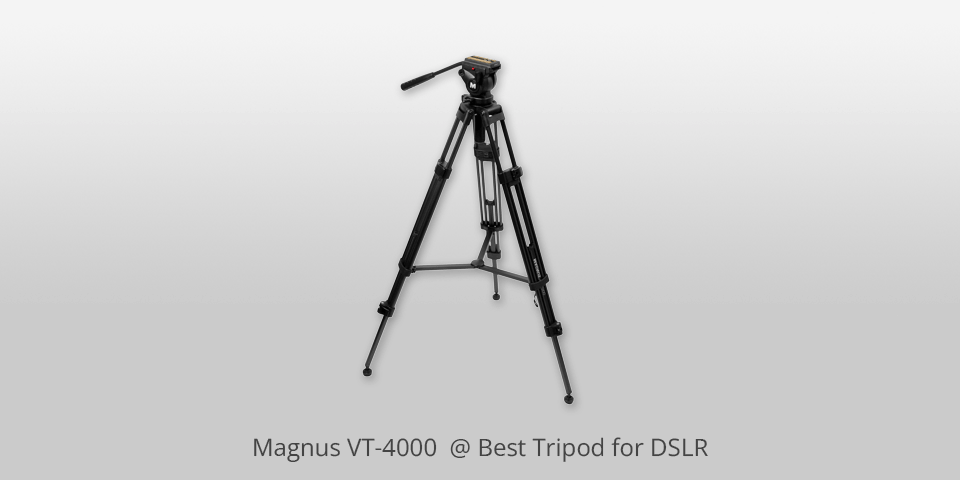
Material: Aluminum, Rubber | Max load: 8.80 lbs | Max height: 4 ft 11 in | Weight: 7.72 lbs | Leg sections: 2/3
This is a wonderful photography and video tripod that surpasses analogs with the incredible stabilization of even the largest DSLRs. It is equipped with ‘stage-opening’ legs, so you can take images and record footage from the most extreme angles.
The legs open at various height intervals, which means it is possible to take low-down shots with ease.
Another advantage of this tripod is a quick-release plate. Thus, you can attach/detach your camera in several seconds.

In general, this tripod for DSLR has lots of cool features that are typically present in more expensive models. For instance, all head controls are located on the left side, so you can have your right hand free for adjusting a camera and handle panning.
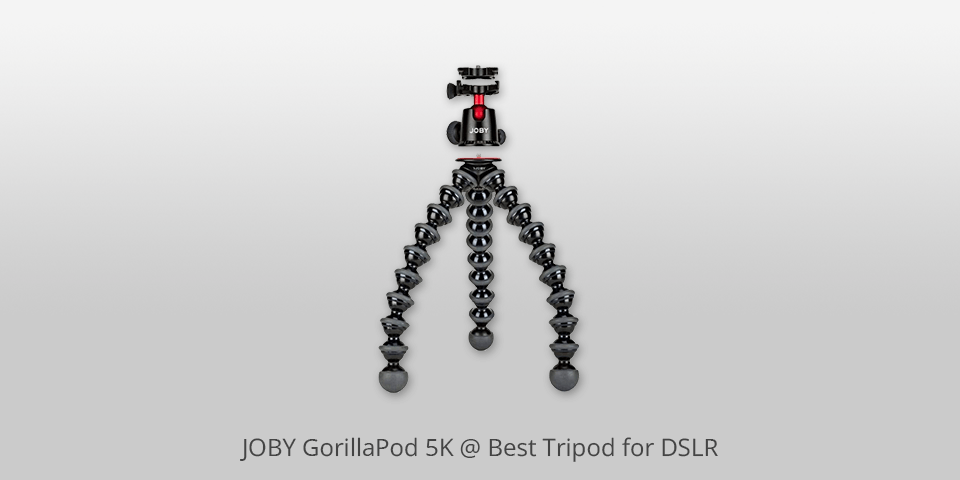
Material: ABS Plastic, Rubber, Stainless steel, Steel, TPE, Aluminum | Max load: 11 lbs | Max height: 1 ft 2 in | Weight: 1.63 lbs | Leg sections: 1
GorillaPod 5K is one of the most popular flexible tripods with aluminum construction. The highlight of the JOBY 5K is its legs and ball head, which are reasonably large to support bulky DLSRs.
The most pleasing thing is that the overall design is compact and flexible. Even if you place this tripod on an uneven surface and plan to take photos from non-conventional angles, it will properly stabilize your camera.
Besides, it is one of the professional tripods that is great for vlogging cameras. With a 360-degree panning bed and 90-degree tilt and bubble level, you can enjoy the most precise position control.
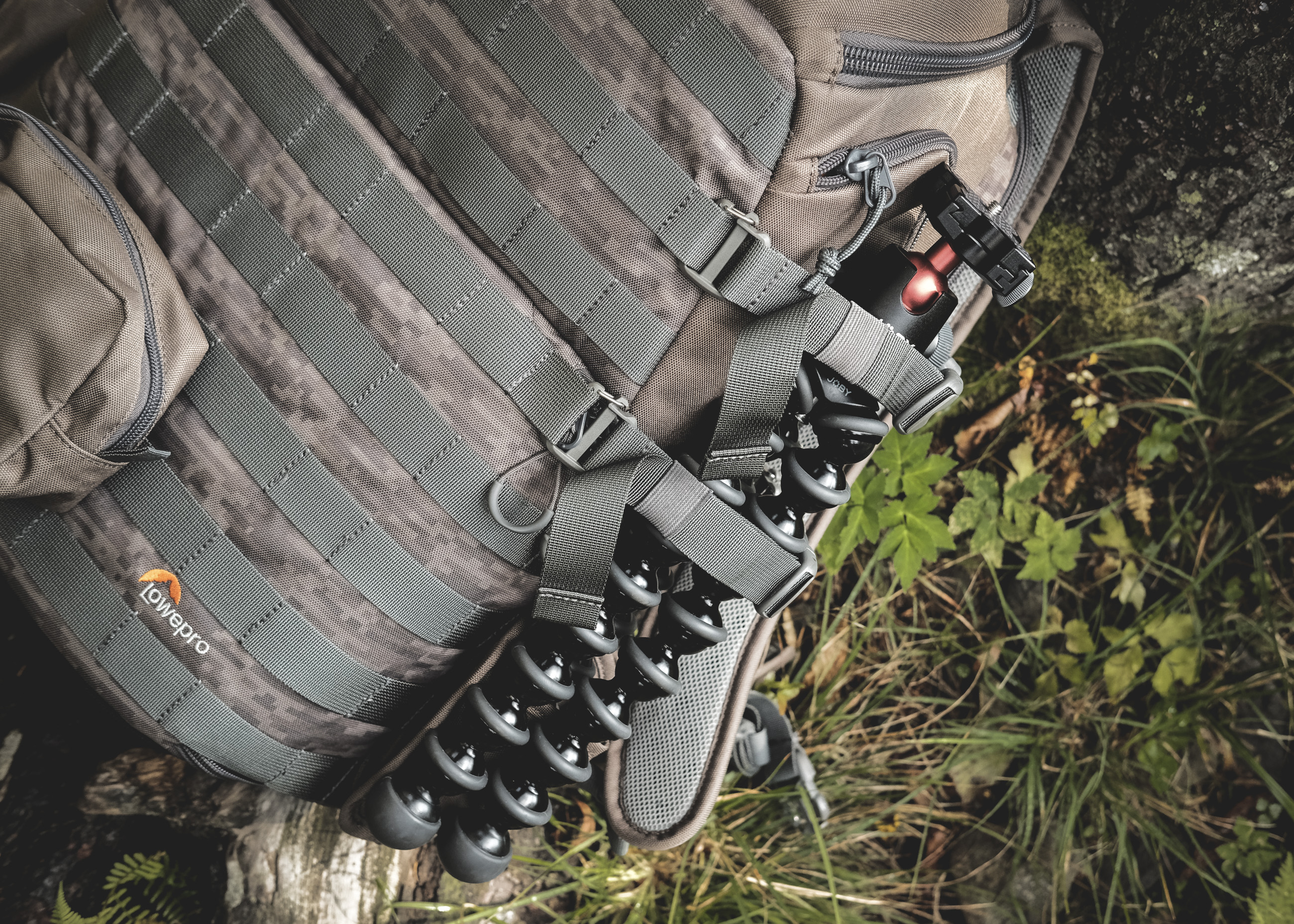
The ball head is compatible with Arca-Swiss® quick release plates, so you can attach a huge variety of modern cameras and lenses. The included 5K ball head also has an independent pan lock that is a real find for 360º shooting scenarios.
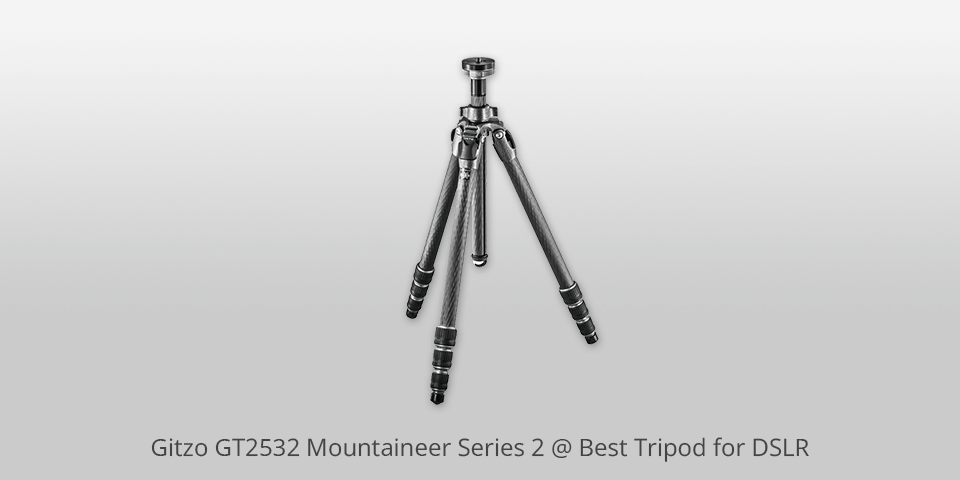
Material: Carbon Fiber | Max load: 39 lbs| Max height: 54.72 in | Weight: 3.7 pounds | Leg sections: 4
If you are looking for the best tripod for DLSR cameras, presuming that it should be super durable, this model can surely satisfy your demands. It has Carbon eXact tubing with High Modulus carbon fiber in the lower leg sections.
Thus, Gitzo GT2532 can be deservedly called a more appealing carbon fiber tripod that its predecessor. Besides, the rapid central column can be easily removed if you want to take images at ground level.
All legs consist of 3 sections and are secured by G-lick Ultra twist locks. The built-in O-ring prevents dirt and dust from getting inside the leg mechanism and eliminates possible problems in the future.

The DSLR tripod also has a brand-new top spider for enhanced rigidity. Bigger leg angle selectors guarantee a wider grip area, so you can have peace of mind when locating your shooting devices on rough surfaces.
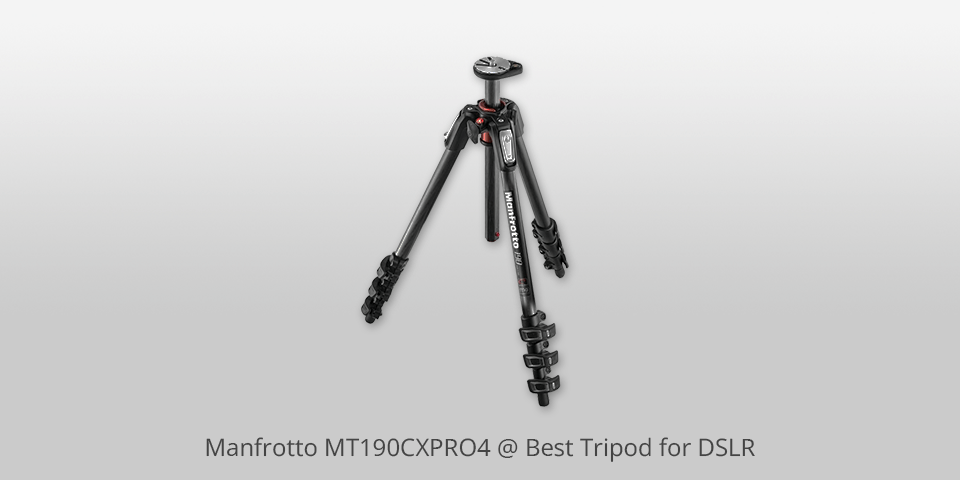
Material: Carbon Fiber | Max load: 15.4 lbs | Max height: 5 ft 2 in | Weight: 3.60 lbs | Leg sections: 4
If you are determined to get the best camera tripod without going bankrupt, this Manfrotto model can fit the bill. It is durable, ergonomic, and easy to set up.
The innovative locking system makes the process of extending legs smooth and lickety-split. In fact, you can transport it in a standard camera backpack. The developers also added the “Easy link” plug, so photographers can quickly connect photo accessories to a tripod.
:max_bytes(150000):strip_icc()/3LW492937_7-7607734f1f5243a59aa0a882a5f6c523.jpg)
For instance, if you specialize in macro photography, you can connect special LED lights, as well as VDSLR apps through arms and brackets.
Photographers also prefer this tripod for its Rotating Leveling Bubble. With its help, you can quickly set up your tripod in accordance with your current shooting needs.
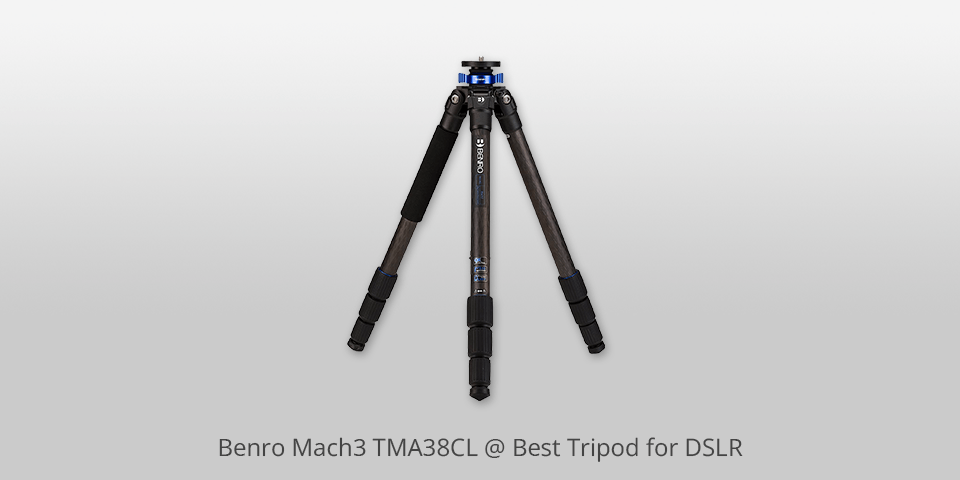
Material: Carbon Fiber | Max load: 35.3 lbs | Max height: 69.69 in | Weight: 4.52 lbs | Leg sections: 4
Benco Mach3 is a perfect sample of how advanced materials can be combined with a classic, recognizable design. Thanks to functional twist locks and magnesium casting, this tripod can become your reliable assistant both during indoors and outdoors.
Moreover, it is regarded by many as a go-to tripod for landscape photography. Thanks to magnesium castings, the model won’t add much weight to your overall load.
The tripod has metal spikes but you can remove them if needed. So, it will provide equally stable support for a camera both on hard surfaces, e.g., ice, or soft ones such as carpets or lawns.

To stabilize the system even more, you can leverage a ballast hook on the center column. Carrying the DSLR tripod around will be easy thanks to the included case.
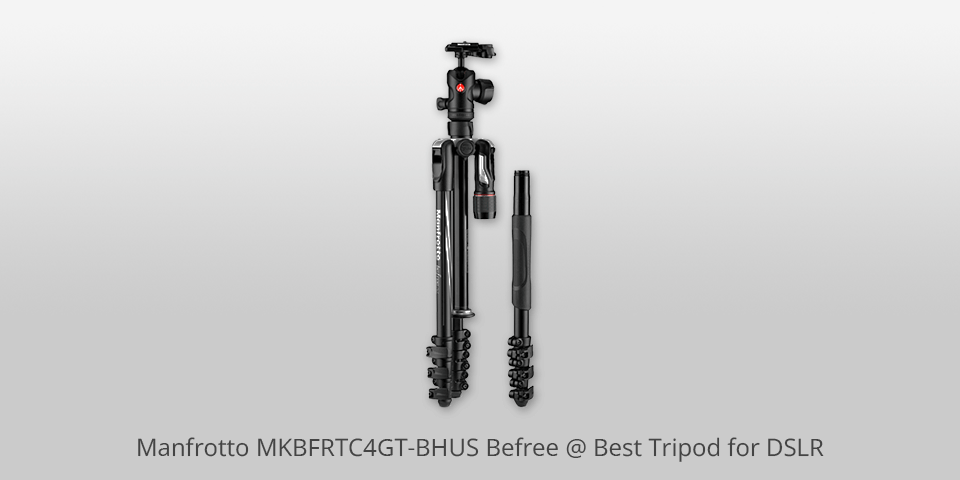
Material: Carbon Fiber | Max load: 19.8 lb | Max height: 63.78 In | Weight: 3.42 lbs | Leg sections: 4
This is one of those Manfrotto tripods that are specifically designed for travelers. It is capable of supporting mirrorless cameras with telephoto lenses attached, as well as premium DSLRs.
Such an impressive load capacity doesn’t mean this model is huge – in fact, it can fit regular backpacks and carry-on bags. It is sold with a convenient carrying case, so you may not worry about damaging it while traveling.

If you like the provided features but the price is a bit high for you, the manufacturer offers a similar model but made of aluminum. It costs less without sacrificing the security of a camera mounted on it.
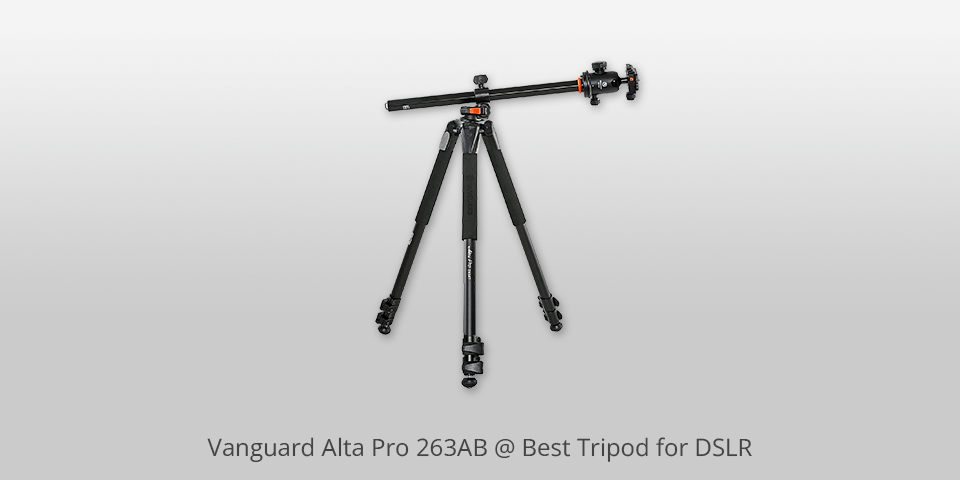
Material: Aluminum | Max load: 15.4 lbs | Max height: 68 in | Weight: 5.4 lbs | Leg sections: 3
The Alta Pro 263AB belongs to the group of professional camera tripods due to its unrivaled flexibility. With it, you can take pictures from all imaginable angles without risking damaging your gear.
The tripod has a multi-angle central column system that allows moving the central column in the 0-180º range both in vertical and horizontal planes. Thus, you can make strides in macro photos and wide-angle shooting.
Besides, there is the instant swivel stop & lock system that makes it possible to change the position of the central column in no time, while keeping the entire system stable.
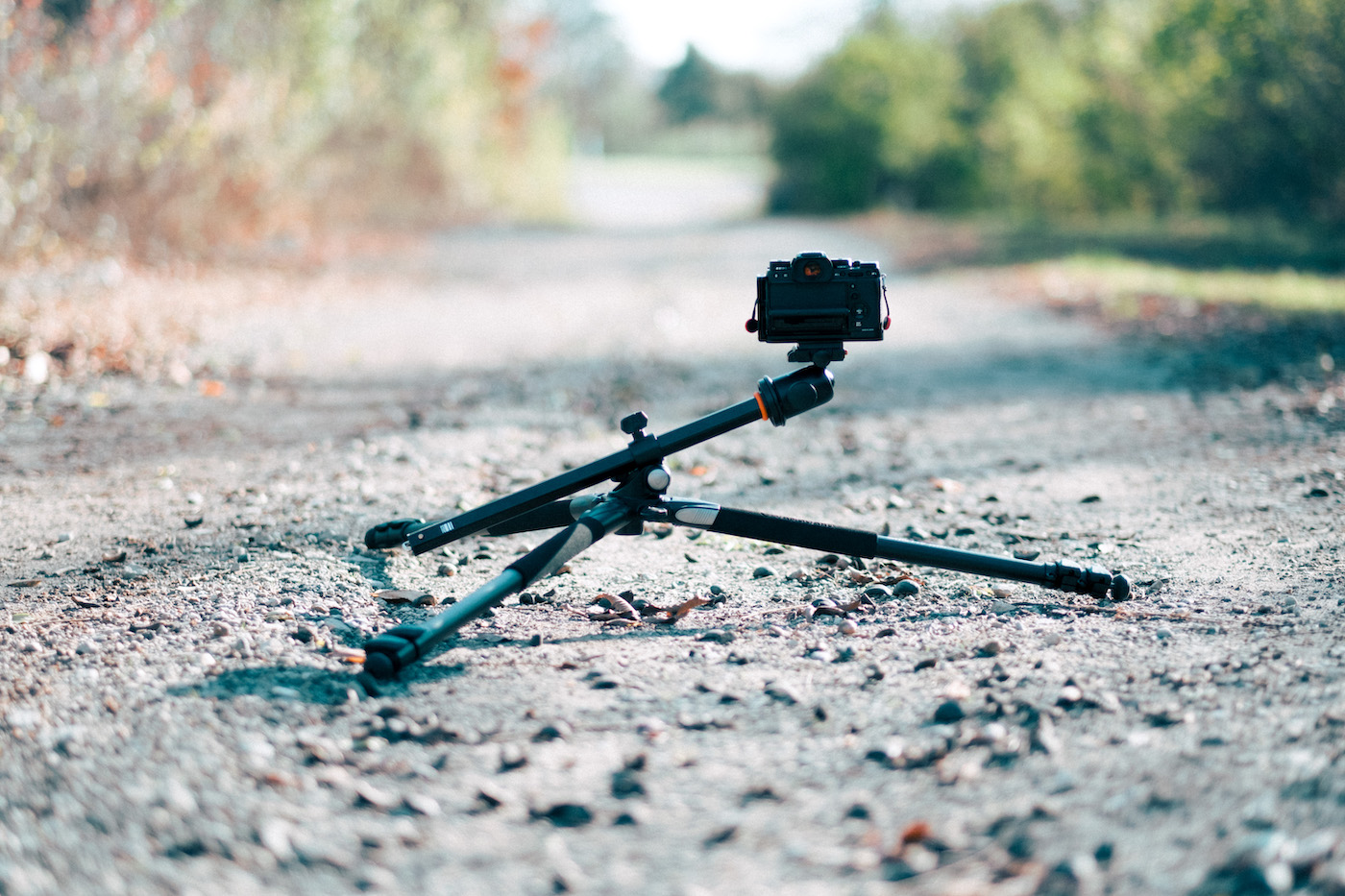
This tripod for macro photography has aluminum alloy legs that can be put at 25°, 50°, and 80° angles with a single button pressing.
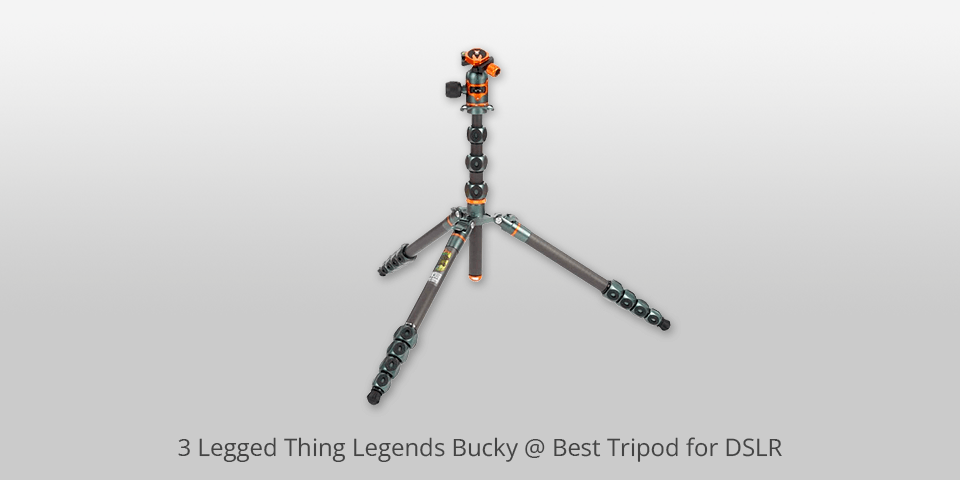
Material: Carbon Fiber | Max load: 60 lbs | Max height: 76.7 in | Weight: 3.24 lbs | Leg sections: 5
If you can afford to purchase a premium DSLR tripod, 3 Legged Thing Legends Bucky is bound to impress you. It has space-saving dimensions and can be expanded to different heights.
Any of its 3 legs can be removed, which means you can effortlessly turn it into a monopod or a camera mini tripod.
I like its adjustability most of all. In fact, you can make tweaks even on the go and regardless of weather thanks to new Rapid-Latches. Frankly speaking, even people with some impairments or those wearing gloves can easily adjust the tripod for convenient shooting.

Bucky has recently raised O-Pads that guarantee enhanced grip and protection from moisture. To achieve maximum stability on any terrain, you can use detach rubber Bootz and replace it with any other foot accessory from the pack.
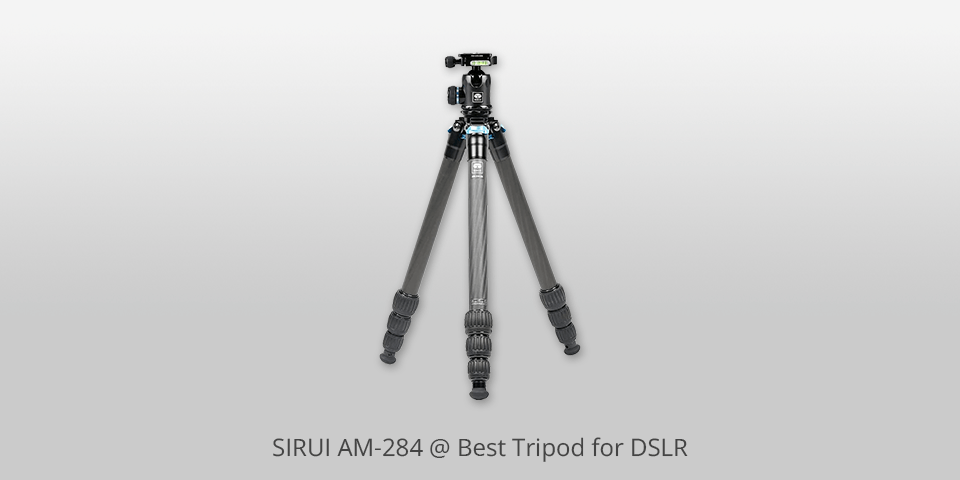
Material: Carbon Fiber | Max load: 33.1 lbs | Max height: 47.2 in | Weight: 2.69 lbs | Leg sections: 4
This product by SIRUI sticks out from the professional camera tripods with its small weight and interesting features. It has A10R Ball Head, which makes customization very prompt.
Besides, there are 4-section carbon fiber legs that can be folded independently to 3 positions, so you can start with ground-level shooting and then proceed with taking images at other heights.
The rubber feet are designed to withstand various challenging conditions, which is particularly important for travel photography.

Besides, the AM-284 has metal spikes and can serve as a tripod for wildlife photography. Each leg has twist-lock joints and a semi-automatic button to adjust tilt angles. Most of all, I like the proprietary locking system that staves off accidental camera sliding.
| IMAGE | NAME | FEATURES | |
|---|---|---|---|

|
Peak Design Travel
OUR CHOICE
|
CHECK PRICE → | |

|
Magnus VT-4000
STABLE
|
CHECK PRICE → | |

|
Joby GorillaPod 5K
FLEXIBLE
|
CHECK PRICE → |
Looking for a decent tripod, you need to consider various factors. First off, you should concentrate on your demands and needs, as well as the type of photoshoots you typically partake in. In general, you can follow the recommendations listed below to select the best tripod for DSLR.
Head types. In general, the choice boils down to ball heads and 3-way heads. The first option is more advisable in terms of speed of setting up and easiness of stowing away during hikes.
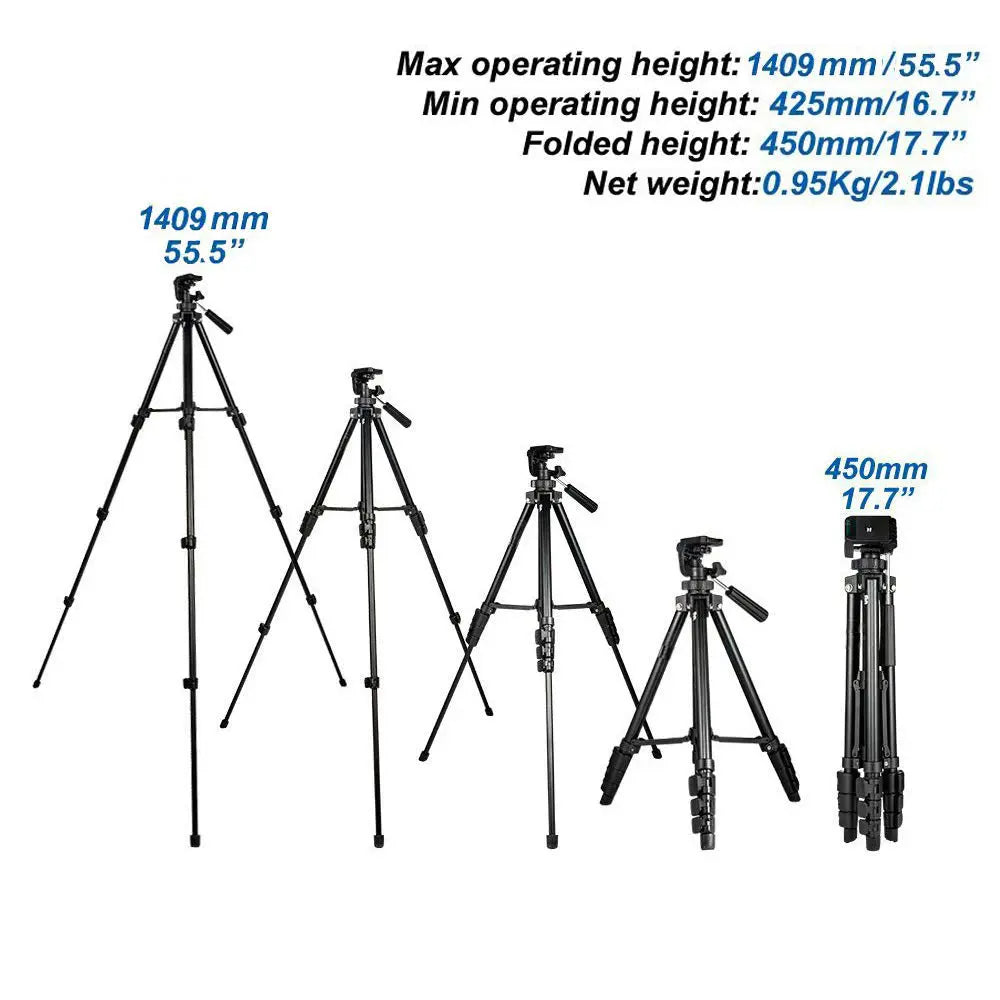
Three-way heads are more cumbersome when customizing but they offer more precise, individual control in all three planes.
Aluminum vs carbon-fiber. Manufacturers usually use such materials to produce tripods. Aluminum models (usually tripods under $200) cost less but weigh more. If you are just starting out, you’d better choose an aluminum tripod.
If you have enough money, a carbon fiber model is 20-25% more lightweight than an aluminum analog, has better vibration-absorbing features, and is more pleasant to touch in cold weather.
Leg sections. In most cases, they consist of 3, 4, and 5 sections. The more parts the legs have, the shorter a tripod is in a folded state. However, you will have to spend more time assembling/disassembling such a tripod. Besides, there are may arise stability issues.
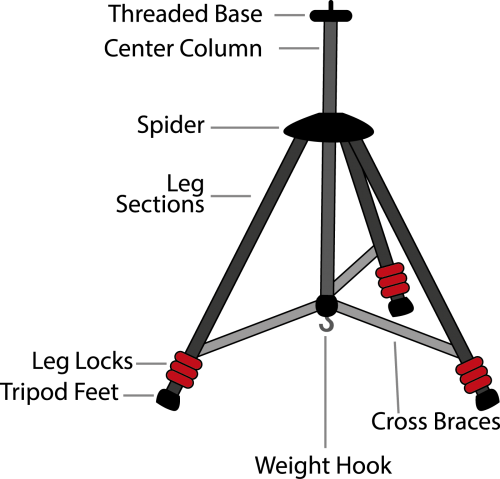
Leg locks. Professional camera tripods are fitted with locks of 2 types – twist and flip. The first option is quicker to use and occupies less space. It is possible to unlock all leg sections with a single movement.
As for flip locks, you need to operate them one by one. However, it is recommended to try both types to understand what works best for you.
Folded length. If you plan to travel with a tripod to different destinations, no wonder you want it to be short in a folded state. Check out this parameter before spending your money.